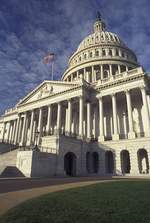Homeland Security and Terrorism Program
New Publications
Out of The Shadows: Getting Ahead of Prisoner Radicalization
A Special Report by
The Homeland Security Policy Institute at GWU and CIAG presented to the Senate Committee on Homeland Security & Governmental Affairs
Featured Conference
Overview

The Critical Incident Analysis Group focuses on time-limited, newsworthy, and provocative events, such as the widely publicized 2004 hostage takings in Iraq. Such events fall under the classification of critical incident because the events create fear and challenge the trust societies have for governments.
The Critical Incident Analysis Group’s Homeland Security and Terrorism Program analyzes terrorist related issues that affect homeland security. For example, in April of 2000 CIAG convened its spring conference in order to examine the threats to symbols of American democracy. The conference examined the architecture of terrorism and the symbolism of its targets. A primary goal of the conference was to understand how American society and its political and opinion leaders will respond to the threat or act of terror. The conference found that how much damage a terrorist act ultimately causes is something society determines, not the terrorist. The terrorist controls what he chooses to destroy, but he doesn’t control how much his act will undermine democratic practices and beliefs, public trust, a national sense of common values, goals and a common destiny. All those outcomes will be a reflection of the state of society’s resilience and the quality of its leadership.
Although there is by nature a tension that exists between the business sector, academe and government, it can also be understood as a necessary balance. Indeed, in the post-9-11 world, the business sector has a significant role and responsibility towards energy, infrastructure, finance, communications, medical care and information technology. This input and relationship can facilitate operational strategies that must be developed and employed through collaboration with academe and government.
